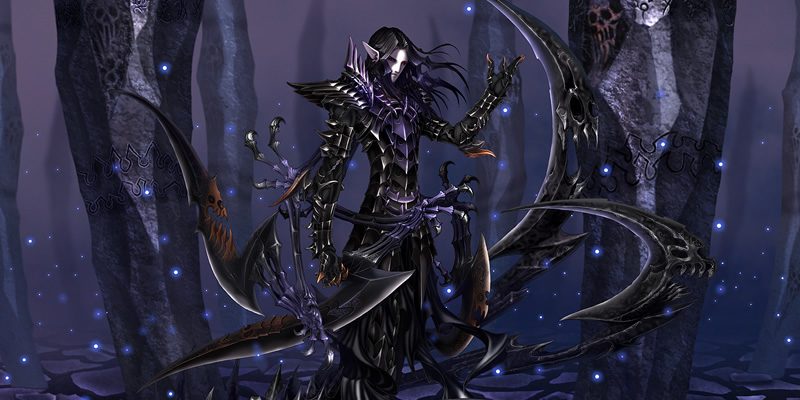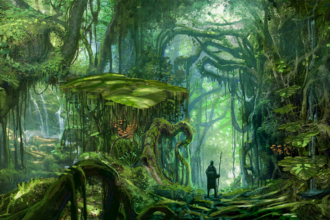Anima: Beyond Fantasy: a Primer for D&D Players

Today’s Guest Article is brought to us by Aaron der Schaedel
Learning how to play a new game can be a daunting task, especially if you’ve only ever played one game. For this reason, I’m putting together a guide for the basic rules of the game Anima: Beyond Fantasy with Dungeons and Dragons as a point of reference, since D&D is currently the most popular role playing game published in the English language. So with all that said, let’s learn a new game today, shall we?
About Anima: Beyond Fantasy
Anima: Beyond Fantasy is game from Spain that was published in North America by Fantasy Flight games in August of 2008.
The setting is described as Dark Fantasy, and has magic and supernatural powers and entities, though they’re not commonplace. As such, anybody or anything with otherworldly powers are likely feared or reviled.
The Dungeons & Dragons setting that most closely matches Anima’s is perhaps Ravenloft, since in Ravenloft most otherworldly creatures can be expected to be inherently evil, or to eventually wind up that way. Anima’s world, Gaia, is filled with many superstitious people who have the negative opinions of the supernatural that you’d expect in a setting like Ravenloft.
The Forgotten Realms of AD&D 2nd Edition is also a good comparison when you consider that even though Al-Qadim was a part of the Forgotten Realms, it was also it’s own setting that had rules and phenomenon wildly different from what you’d normally find in Forgotten Realms. Different regions and countries treat the supernatural differently in Gaia.
The Basic Rules
The very core of D&D and Anima are almost identical: to determine the success of an action, you roll a die, add bonuses and modifiers, and compare it to some other number. (Be it decided by the GM or also rolled for.)
The most obvious difference is that Anima’s dice of choice for most rolls is a d100, with all the possible bonuses and penalties usually being two digit numbers like 20, 40, or 80. This makes the math a little bit more difficult, since the numbers are bigger, but it’s nothing that can’t be solved by keeping a calculator or scrap paper handy.
Also, once you consider that most of the numbers Anima uses are increments of five, and that a d100 has five times as many possible outcomes as a d20, most numbers in Anima can be given a D&D equivalent by dividing by 5. Thus, an Attack Ability of 75 in Anima would be the same as a Basic Attack Bonus of about 13 for D&D.
However, it’s worth making note that how high a particular ability, such as attack or dodge, starts out as or increases upon level up is largely up to the player’s discretion based on how classes work in Anima.
Classes
While the basic mechanic is the same for both games, and the numbers used can be converted somewhat easily, everything that is built around and relating to the core mechanic is at least somewhat different.
For starters, while both games are class based, the role classes take in both games is different. In Dungeons and Dragons, your class determines what special abilities your character might have, as well as how their mundane abilities improve, making what class you start as and what class you level up in important decisions for developing your character.
This is why multi-classing is a tool frequently used by players looking to make characters that are exceptionally powerful in Dungeons and Dragons, since a character’s abilities are tied very closely to the classes they have levels in; the only way to be effective with “Divine” spell-casting is to have levels in a class that grants you such spells.
Anima takes a somewhat different approach by granting more control over what abilities your character gains at certain levels. You class grants certain bonuses you can always expect to have for leveling up, but you also gain “Development Points,” which can be used to improve any aspect of your character.
This means that it isn’t out of the question to have a Wizard that can also use heavy armor and weapons, or a Warrior that can also cast spells. However, you class still has an impact on how your character can use their development points; raising your spellcasting ability as a Wizard costs less than if you were a Warrior, while Warriors would spend less raising their skill in wearing armor.
Additionally, changing your class is a much more difficult endeavor in Anima, requiring you to spend some of your development points, and then waiting two levels before you can be considered a different class. These two functions of class in Anima make your class a much more long term decision.

Special Abilities
Another key difference between D&D and Anima is the special abilities available to characters. As was mentioned earlier, special abilities in Dungeons and Dragons are generally a function of your class, whereas in Anima, your class determines how easily they improve.
The most common special ability in Dungeons and Dragons always seemed to be casting magic spells, and the type of spells you could cast was determined by what class it was that granted you magic.
This was also how we got the four class archetypes in D&D: Martial, Skilled, Divine caster, and Arcane caster. Almost every class in the core rulebooks of D&D fits into one or more of these.
Anima takes things in a slightly different direction by removing “Divine caster” and replacing it with “Psychic.” (Granted, Psionics were a thing in D&D, but never as a part of the core classes.)
Furthermore, even though Anima uses a lot of similar archetypes to D&D, the specific ways each of these archetypes manifest their abilities is different.
Martial Characters
Martial characters have the standard fare of being good with weapons and armor, however, unarmed martial arts are handled radically different in Anima. A character has to spend Development Points in order to learn a specific martial art, which grants them special abilities and bonuses when fighting unarmed.
The best part about martial arts, however, is that the different bonuses and abilities stack. As an example, Capoeira allows a character to use their legs to make area of effect attacks, while Taekwondo allows a character to make an additional attack each turn, as long as that attack is with their legs. A character that knows both of these martial arts can make TWO AoE attacks each turn using their legs!
Additionally, as a character learns martial arts, they gain Martial Knowledge, which is used to learn various abilities involving Ki. These range from being able to perform special combat maneuvers, to being able to run across walls or water, or project your ki into your hands and allow you to knock away magic spells!
Arcane Characters
Spellcasting in Anima relies on gathering a magical energy called “Zeon.” A character spends a few moments gathering the energy necessary, and then they cast the spell when they’ve gathered enough energy. The amount they need is based on the spell being cast, while how many turns it takes to cast a spell is based on a stat called “Magic Accumulation,” which is how much Zeon they can muster in one turn. This is something that can be improved by spending Development Points.
The one commonality D&D spellcasting has with Anima is that in order to cast a spell, a character needs to either learn the spell, or have a scroll or book with the instructions for casting it they can read from. While such instructions are usually destroyed upon use in D&D, in Anima the spellcasting process is slowed down as the caster cannot focus entirely on gathering Zeon.
Summoning otherworldly creatures also falls into the purview of arcane characters, which is another ability that relies on Zeon. Summoning includes calling forth otherworldly creatures, as well as making them bend to your will, or banishing them if you or somebody else was unable to successfully control them.
Alternatively, if the idea of losing control of a creature you’ve summoned is a risk somebody is unwilling to take, the summon ability can also be used to invoke the power of certain otherworldly entities, though usually these entities won’t lend their power until a quest has been completed for them.
Psychic Characters
Psychic powers are the most mutable of all powers in Anima. You gain “Psychic Points” by leveling up, as well as by spending Development Points. Psychic points are able to be used to gain access to new psychic abilities, or to improve the strength of your current psychic abilities. As a general rule, if a Psychic Point can be used for something, it can be used on a temporary or permanent basis. If it’s used for a temporary advantage, it’ll return after about an hour or so, but for permanent advantages, the point is lost permanently as well.
The drawback to this mutability of psychic powers in Anima is this: whenever a psychic power is used, you first roll to see how effective the power is. If a roll comes up too low, not only will the power have no effect, but it can also physically drain the psychic!
Skill Characters
The only reason difference between D&D and Anima in regards to characters that focus on skills is that the limits on a character’s skill level in D&D is based on their level; whereas in Anima, under normal circumstances, no roll can ever be higher than 280; any result higher than that is always treated as if it were 280.
Miscellaneous Differences
Advantages and Disadvantages
Advantages and Disadvantages are the closest thing Anima has to Feats, and baring optional rules, can only be taken during character creation. They range from flat increases in certain
attributes, to bending certain rules, much like feats do.
Character Stats
Contrast to D&D’s six stats, Anima uses eight. Their function is pretty much the same, with the rating of the stat governing a bonus it grants to relevant abilities.
Here’s a summary of the eight stats used in Anima:
- Agility – How quickly your character can move
- Constitution – Physical hardiness of your character, same as in D&D
- Dexterity – Precision of your character’s movements, similar to D&D
- Strength – Physical might of your character, same as in D&D
- Intelligence – Reasoning and comprehension of your character, same as in D&D
- Perception – Senses and ability to notice things, one of the functions of Wisdom in D&D
- Power – Spiritual strength, important for magic
- Willpower – Mental strength, important for psychic
Final Notes
Anima: Beyond Fantasy and Dungeons and Dragons really only have one core mechanic in common, and are only in the same genre in the broad sense of Swords and Sorcery Fantasy. I also barely scratched the surface of all Anima has to offer, and with that said, Anima isn’t necessarily a game for the faint of heart: it’s a great deal crunchier than Dungeons and Dragons.
None the less, though, I’m confident that if somebody had the dedication to learn the intricacies of Dungeons and Dragons, they could also learn Anima. The North American edition of the book does suffer from some glaring design flaws that might make this task difficult. Rules are often hidden within descriptive prose, and some sentences are structured in ways that are strange or confusing to English readers. The most problematic flaw, however, is that the book doesn’t have an index.
A missing index in a book wouldn’t normally be a problem, except that there’s a lot of charts that don’t follow a discernible pattern, and the table of contents doesn’t show where these charts are.
So with all that said, go forth and learn a new game!

Anima: Beyond Fantasy is a Spanish role-playing game developed by Carlos B. García Aparicio and Anima Project Studios. The English version is produced by Fantasy Flight Games, and it can be purchased through DriveThruRPG.
Today’s Guest Article is brought to us by Aaron der Schaedel
Aaron der Schaedel is a man of many talents; one of them is learning new games. This has lead to him having several rule books that will likely never see use at a game table. To put his rulebooks to good use, Aaron has taken to the internet to spread the word of the games he’s learned.




